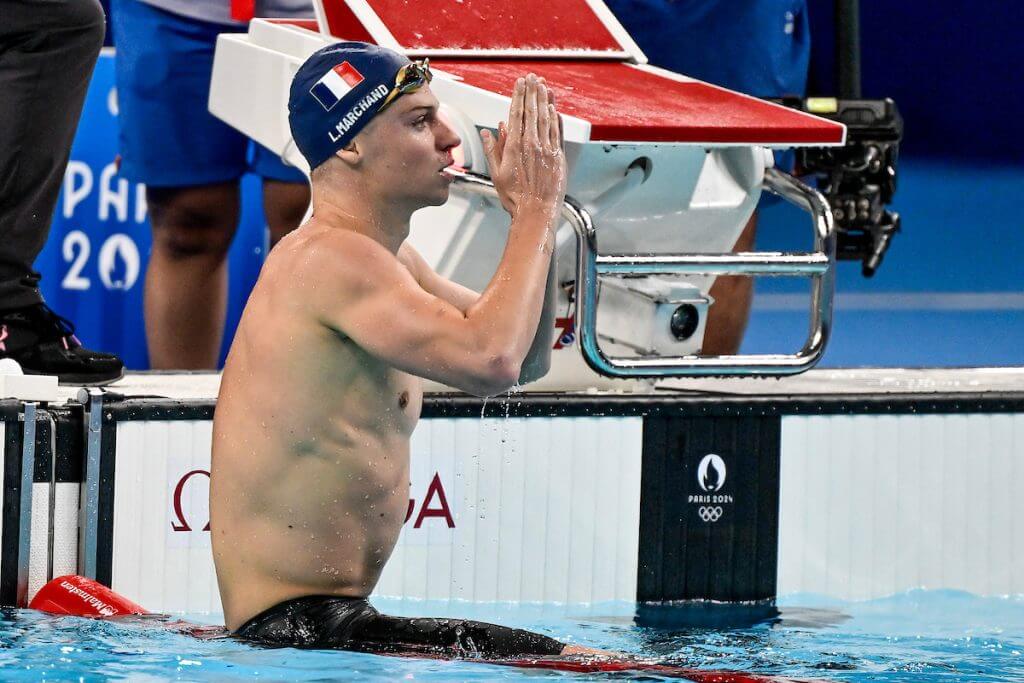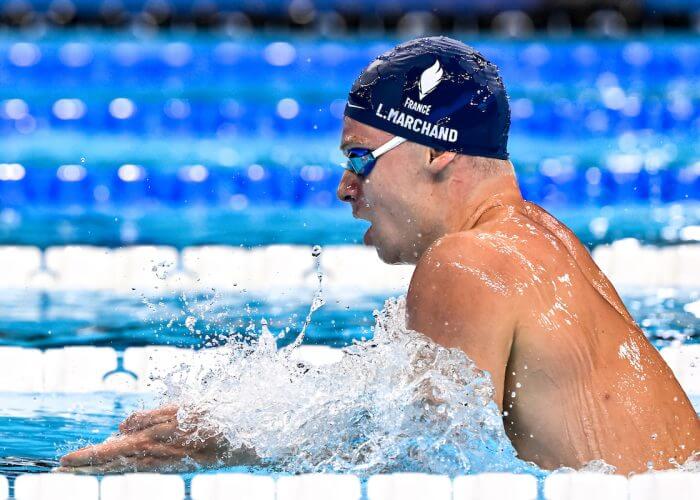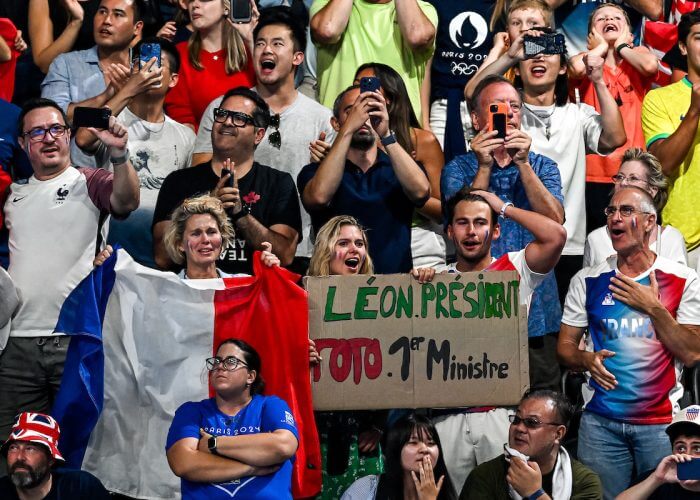Leon Marchand and His March to Olympic Legend: Nine Days of Greatness

Leon Marchand and His March to Olympic Legend: Nine Days of Greatness
For nine days in the pool at the Paris Olympics, Leon Marchand brought down the house at the Paris La Defense Arena, metaphorically.
At the end of two weeks in a home-country Olympics widely regarded as a successful spectacle, Marchand quite literally brought a close to the Games, with the honor of extinguishing the Olympic flame at the Tuileries Palace.
In between, the Games could scarcely have gone more perfectly for Marchand. Serenaded by spontaneous renditions of La Marseillaise, greeted by queues of spectators stretching nearly a kilometer outside the arena, right down to the seamless substitution of his name into ubiquitous “Allez les Blues” chants that became “Allez Le-On” – it all came together as well as Marchand could’ve dreamed.
Or, rather, as well as Marchand and coach Bob Bowman would’ve meticulously planned, for years. Since Marchand’s debut on the Olympic stage, making an Olympic final in Tokyo at age 19 in the 400-meter individual medley, Marchand’s moment has been telegraphed. The Toulouse native would reach the height of his powers around the Paris Games, before home fans, after a marauding career in the NCAAs that gave a promising youth swimmer the chance to become a mythic figure.
Four gold medals and a relay bronze is at the top end of the range for what Marchand would’ve dreamt of. It puts him in select company, only Michael Phelps (twice), Mark Spitz and Kristin Otto having accumulated that many individual golds in the pool at a single Olympics. But the grace with which Marchand has met this moment preserve the hope that it is just a beginning.
“It’s been unbelievable,” Marchand said after his individual program concluded. “Four gold medals is not what I thought I could possibly do. I was trying to win one at first. I had four chances of doing it. So, after the 400 IM, I was really relaxed by the crazy race that I just did. Four gold medals, I didn’t know it was possible.”
A Parisian Dream
It seemed hard to believe, when Marchand touched the wall first in the 400 individual medley, that it was just his first Olympic medal. He’d so established himself over the last three years that an Olympic medal was the last major accomplishment left. Ten NCAA championships, five World Aquatics Championships and a world record seemed too vast a resume for someone making an arrival.
His first foray onto the podium fit the pedigree. He dominated the field in the men’s 400 IM on Night Two. While a passel of swimmers battled it out in the 4:08s, Japan’s Tomoyuki Matsushita winning silver, Marchand had already touched the wall and absorbed the first shockwaves of adulation from the capacity crowd. His time of 4:02.95 downed Phelps’ Olympic record from Beijing in 2008 by nine tenths, perhaps only a sluggish pool preventing Marchand from eclipsing his own world record of 4:02.50.
“I had goosebumps on the podium,” Marchand said. “I felt really proud to be myself and to be also French tonight. It was an amazing time for me, and I was really living in the moment.”
Marchand’s meet – and the swimming competition writ large – reached its apex on Night Five, the midpoint of nine days and 17 sessions. Despite the gentle dissuasion of Bowman, Marchand sought the challenge of a daunting double, the 200 butterfly and 200 breaststroke. Beyond 1,200 meters of racing that prelims-semis-finals would require, he had in his way the reigning Olympic champions in both events.
In one of the most amazing sessions in Olympic swimming history, Marchand rallied from a deficit at the 150-meter wall to overhaul Kristof Milak in the 200 fly by a half-second, setting an Olympic record and a French mark of 1:51.21. He returned some 115 minutes later to build a massive lead in the 200 breast and hold off the charge by Zac Stubblety-Cook by a comfortable second, winning in 2:05.85 to nab the Olympic and European records. It brought a phone call from French president Emanuel Macron and deafening rounds of cheers from what Stubblety-Cook thought was a rugby crowd and 400 IM bronze medalist Carson Foster mistook for a soccer stadium.
“It just shows the incredible work that he’s done for many years to get here,” Bowman said of the double. “It’s not just tonight, but the way he handled it. His attitude about it was amazing. The way that he moved through the different parts of it and how he planned how to swim each race, were just exactly right. And so I’m so proud of him.”

Leon Marchand of France competes in the swimming 400m Individual Medley Men Heats during the Paris 2024 Olympic Games at La Defense Arena in Paris (France), July 28, 2024.
After that, the fourth jewel in his crown seemed … merely mortal. Marchand did what he does best, strangling a field and leaving it under no illusion they’re chasing anything above silver. For the third straight race, he vanquished the reigning Olympic champion head-to-head, China’s Wang Shun getting bronze. For the fourth straight race, he set an Olympic record, 1:54.06, more than a second clear of Duncan Scott of Great Britain, and added the week’s second European record.
Lost in the golden hysteria was a significant performance in the men’s medley relay, Marchand swimming breaststroke to help France win its first ever medal in the culminating relay. It brought a medal for Maxime Grousset, who had missed out individually, and added a sixth to the account of Florent Manaudou, the 50 free bronze medalist who bridges back to the last generation of French stars when he won gold in the 50 in London 12 years ago … or, as is the new chic metric, back when Marchand was in grade school.
Marchand’s accomplishments in the water were monumental. But to do so before a home crowd, as one of the faces of the Games, with the label of being the next Michael Phelps, is beyond measure.
“I think that’s something that I’m really proud of,” Marchand said. “It was not easy for me. I’m only 22. There was a lot of pressure on my shoulders. I was much more relaxed after the 400 IM. I think I’ve been practicing mentally for that. I think I did pretty well. I’m really happy with it. But yeah, it was a lot of pressure. I’m not used to that. I don’t think anybody can be used to that.”
The Next Chapter
As midnight neared after Marchand’s double, Bowman struck a discordantly ominous note.
Perhaps it was the old coach’s clock ticking down to how soon Marchand’s preliminary swim in the 200 IM would seem the next morning. But it was also an illustration of why Marchand had sought out Bowman, and why Bowman had eschewed a near certain chance to be the U.S. head coach at these Games to instead shepherd his prized pupil.
No swimmer since Michael Phelps has had the potential that Bowman saw three years ago in Marchand.
No swimmer since Phelps has done what Marchand was in the midst of doing in Paris.
And no swimmer since Phelps will feel the pressure, the demands of celebrity, the enormous expectation that await Marchand after the Paris halo burns off.

Supporters of Leon Marchand of France during the swimming 400m Individual Medley Men Final of the Paris 2024 Olympic Games at La Defense Arena in Paris (France), July 28, 2024.
“The key thing for him, which sadly, I know about – he doesn’t know about yet – is he’s got to survive the success,” Bowman said. “He’s got to come out of what’s next. And he has no idea, but I know exactly what’s next. And then somehow find his way back to a pool in Austin, Texas, and start going up and down it.”
Though his performance didn’t betray it, Marchand confessed to the difficulty of coping with the spotlight. A generally quiet person who only opened up after some time at Arizona State, he admitted discomfort at being “the center of attention.” But he also trained for it as sure as he prepped starts and turns, choreographing what time he needed for himself and what he could allot for others.
The impetus for Marchand on the road to Paris might be even more vital after. He has never swum to be famous or gain attention but to challenge himself and the standard of what is possible. After Paris, his goal will not be chasing the same dopamine hit of adulation but to continue pushing the boundaries of what he can do. His quest has always been rooted in curiosity – what can I do if I swim the 500 free at NCAAs? Is it possible to win the 200 fly and the 200 breast in the same session? Bowman will stoke that even more now.
“What was really exciting for me was the fact that we didn’t know if it was possible,” Marchand told Le Monde of the double after the Games ended. “I’m very curious to know how far I can go and what my limits are. And at the same time, I don’t want to know because it’s a constant search for perfection. I’ll never be perfect, I know that very well, but every detail counts in swimming, and that’s why I get up every morning, to try and push my body to the limit.”
Both Bowman and Marchand know he can improve. Bowman believes it, beyond piecing together splits. Marchand was somewhat stung to leave Paris without a world record; if his quest is to challenge the status of Phelps among the pantheon of greats, he knows one world record won’t do it.
Bowman has coached three of the last five Olympic champions in the men’s 400 IM – Phelps, Chase Kalisz and Marchand – in perhaps the purest measurement of swimming excellence. Marchand, as the world-record holder, is the best of them, Bowman said. But with more to come. For someone who has taken the world record from 4:03 to 4:02, Marchand will certainly wonder what other round numbers – dare he dream of breaking four minutes? – could be possible.
“He’s the best in this event in history,” Bowman said. “He can be better. He’s not reached his potential. That was a great swim. He can definitely swim faster than that. I rank him at the top right now because he’s just got the total package. He’s got the speed. He’s got the endurance. He’s got the underwaters.”
And he’s got the comparisons to Phelps, cemented forever by what Marchand achieved in Paris. But where Marchand has the chance to take it further is in living out Phelps’ legacy. When the gangly kid from Baltimore ascended to the international stage, he aspired to change the sport of swimming. It’s taken time from his second retirement after the Rio Olympics, but the seeds he’s planted are blooming. More than 20,000 spectators filled Lucas Oil Stadium for the U.S. Olympic Trials in June. An arena that holds 30,000 for rugby matches in Paris was stretched to its acoustic limits by Marchand Mania. The 2028 Olympics in Los Angeles will bring swimming to SoFi Stadium, where attendance could top 30,000.
Marchand has taken the torch – he’s done a lot of that lately – from Phelps. He’s carrying it, and the sport, forward.
“Michael is a swimming legend,” Marchand said. “I’m always really proud when someone is comparing me to MP. He changed the sport forever… I know how Coach Bowman was working with him. I think our training is the same. It’s been an amazing ride.”



